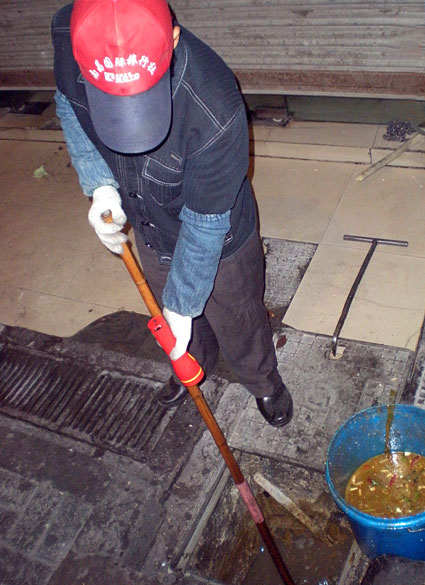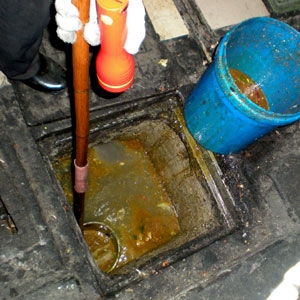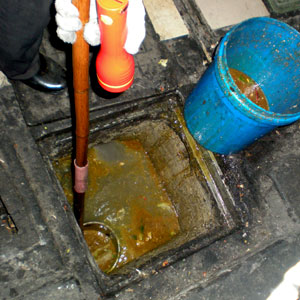 Nice catch: A man skims used cooking oil from the sewer.Photos: Andrew SteinStrolling along an alley lined with restaurants late one evening in Hangzhou, China, the fetid stench of sewage and rotting food wafted deep into my olfactory grooves. As I began to turn a pallid green, I’ll never forget the sight that jolted me back into consciousness: a lone man fishing in the sewer for the cooking oil swirling chunkily around the surface.
Nice catch: A man skims used cooking oil from the sewer.Photos: Andrew SteinStrolling along an alley lined with restaurants late one evening in Hangzhou, China, the fetid stench of sewage and rotting food wafted deep into my olfactory grooves. As I began to turn a pallid green, I’ll never forget the sight that jolted me back into consciousness: a lone man fishing in the sewer for the cooking oil swirling chunkily around the surface.
For months I had been hearing about a black-market sewer-oil industry, but the thought was just too difficult to digest. Living in a state of incredulity seemed like a good alternative to a compulsively upset stomach. That is, until I caught the aforementioned sewer-oil fisherman red-handed (literally, with a red flashlight in hand to distinguish swill-oil from plain sewage in the dark of the night).
I tried to talk with him but he eluded me, moving quickly down the street from sewer cover to sewer cover, skimming used oil from the sewer and plopping it in a large bucket. When I asked what he would do with it, he simply replied, “It will be reused.”
Now, I’m all for recycling. But there must be less gross — and unsanitary — ways to handle it.
Feeling swill
Earlier this past year, headlines buzzed with news about hazardously unsanitary Chinese cooking oil. He Dongping, professor of food science engineering at Wuhan Polytechnic University, sparked the flames. His investigative study found that 10 percent of meals cooked across China use oil that has been reprocessed from discarded kitchen waste. This oil, called swill-oil, often contains high levels of aflatoxin — a toxic fungus and notoriously potent carcinogen.
Swill-oil makes its way back to people’s plates from two chief sources: the market and the drain.
Most food in China is stir fried in a wok with oil; personal ovens are rarer than restaurants that don’t use MSG. With more than 1.3 billion people producing thousands of tons of waste-oil every day, a dirty black market has formed around this slippery commodity.
Restaurants could dispose of their excess oil in a sanitary way using government-provided services. But … they don’t.
Why? The government-run services cost money. And what business playing by modern capitalist rules wants to pay for a government service when they could instead get paid to use a private service that provides them the same benefits?
“Restaurants have to pay a certain fee if they hire the city’s sanitation workers, whereas selling kitchen waste to private parties can make up to 10,000 yuan ($1,500) every year,” the director of the Wuhan Airui Biodiesel Company told China’s Xinhua News Agency. According to this report, “a large restaurant is capable of making 2 million yuan ($294,117) per year just by selling its kitchen waste.”
These private companies take waste oil and refine it using machines or simple methods. The result is a substance that by appearance and smell alone is difficult to distinguish from store-bought cooking oil, but in actuality is very toxic.
So not only are restaurants incentivized to sell their used oil to private contractors, but they’re also incentivized to buy the processed-oil back. The price of swill-oil is “half that of ordinary cooking oil,” noted the government mouthpiece China Daily. According to He Dongping, the swill-oil industry turns a profit of 1.5-2 billion yuan annually. “The profit margin is almost 200 percent. It’s easy to understand why the business is so hot.”
In an industry with huge profit margins, every bit of slop oil counts. Large quantities of oil get washed off kitchen utensils and flow down the drain. And by drains, I mean sewers.
 Ew. Just … ewwww.Slick operators
Ew. Just … ewwww.Slick operators
This past summer when I was in Yunnan Province, I had a conversation with a concerned government official about controlling sewer oil.
“Why doesn’t the government do something about it?”
“It’s difficult,” he replied. “We don’t have much power over the situation. There’s no specific law that forbids this type of activity, and we don’t have adequate resources to properly enforce this kind of law.”Although China’s FDA equivalent issued a nationwide notice about the swill-oil situation in March, it seems that there isn’t much this local government is able to do about the situation.
Since then, there have been several crackdowns in China. The New York Times reported that in the city of Chengdu, food safety officials named 13 restaurants that had been found to be using illegal cooking oil. While this news shows ostensible progress, there are far more than 13 restaurants across China using swill-oil, and in a country with a quickly evolving legal system, the tangibility of a law prohibiting this activity is uncertain.
Nonetheless, the Chinese government seems to be concerned with this development. Since detecting and identifying the use of illegal cooking oil is tough, “there is an urgent need to improve kitchen waste recycling procedures to prevent the continued use of such oil in food production,” said China Daily.
One way that the government might improve such procedures is to get people using the systems that currently exist. You’ll remember that the public sector does provide sanitation services, but that no one uses them because of their cost. The private sector — the swill-oil producers — is succeeding due to its market savvy-behavior. If the public sector coughed up some cash for using its services, too, it might gain more control over the situation.
The majority of swill-oil in the market comes directly from restaurants, so the swill-oil industry would shrink considerably if restaurants could be persuaded to sell the bulk of their used oil to public sanitation services. As for the sewers, I’m sure that a few audacious men and women would still go fishing for oil — but if sewers were the only place swill-oil was coming from, it would be much easier for authorities to focus their attention.
Grease these palms
To depose the swill-oil mafia of their current stranglehold of the used oil market, the government will have to absorb the approximately 1.5 billion yuan industry. Here’s how it could do so:
- Biodiesel: Recycled waste-oil can be used sustainably for fuel in the form of biodiesel. Local Chinese sanitation departments could team up with public transportation departments and make massive bus fleets bio-friendly.
- Roof Bio Coating: A new polymer for roofs that helps regulate building temperature can be made from used cooking oil. China is building at an unparalleled rate. Using recycled materials will help offset the environmental impact of the country’s nationwide construction craze.
- Soap: Can swill-oil actually produce soap to clean our
bodies? Beijing Forestry University researchers say yes.
China’s state-owned enterprises are quite adept at turning profits, so the government could create lucrative, sustainable, and sanitary industries from the country’s swill-oil problem. That kind of recycling would be a lot more appetizing.



